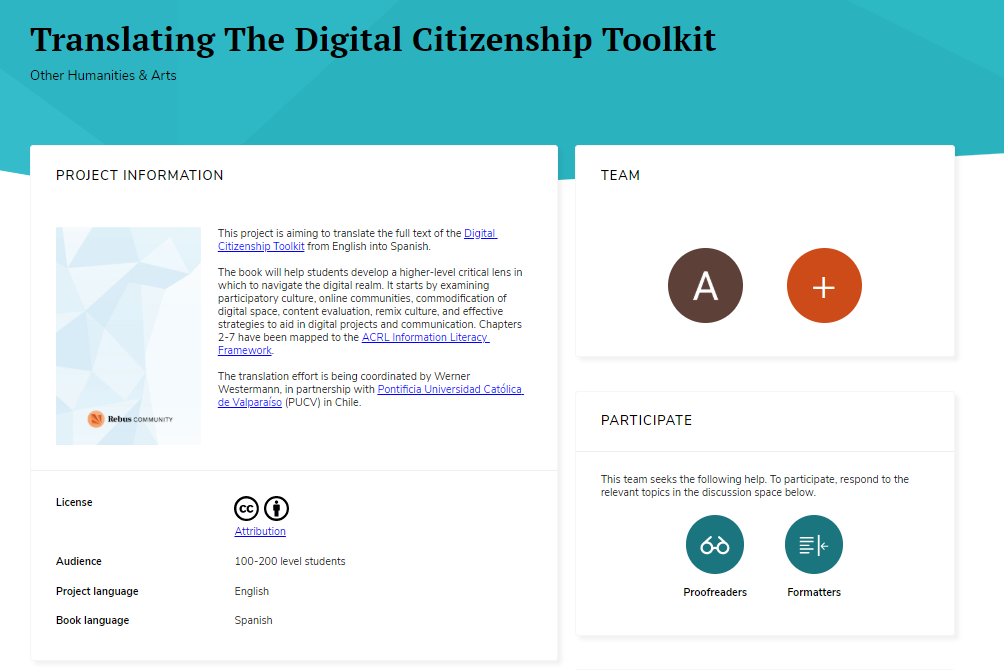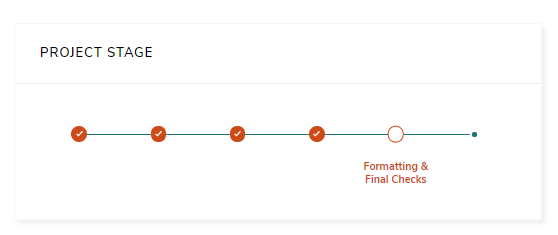This is the fourth in a series of reports filed by Donna Langille, a practicum student who joined us for the spring of 2019. We’ll be releasing each chapter as a blog post weekly. Find the complete text at Rebus Community Reports.

Found in Translation
Werner Westermann’s travels through culture, community, and citizenship
According to an Online translation agency, converting a text from one language to another generally involves more than just translating the words. The conventions of culture bring their own distinct influences to written language. Conventions and expectations around making OER can also vary internationally, so when Werner Westermann embarked on an OER-in-translation project, the process was sure to be layered with complexity.
As a history teacher who also runs a civic education program at the Library of Congress in Chile, Werner’s focus is on engaging citizens with their democratic institutions. Although he has been involved with open publishing since 2003, his great interest lies more in the processes of pedagogy than in the production of finished books. Of course the two go hand in hand, but when it came to his first project with Rebus Community, Werner was most curious to learn about the collaboration aspect.
After having received a small grant to develop a digital textbook for students in grades one and two, Werner became interested in textbooks for higher education. He was able to convince administrators at la Pontificia Universidad Católica de Chile to work on an open textbook project; funding from the U.S. Embassy (in the amount of $20,000) would allow them to explore the development of infrastructure for open publishing. Part of Werner’s aim was to start up discussion on the pedagogical use of open textbooks, rather than commercial ones.
In Toronto for the 2018 Creative Commons Global Summit, Werner met Hugh McGuire and learned about the existence of the Rebus Community projects platform. He was particularly drawn to Rebus because of the community-centred approach to creating textbooks, and soon offered to translate the in-progress Digital Citizenship Toolkit. The English-language project, led by Michelle Schwartz at Ryerson University in Toronto, intrigued him because of his background in civic engagement. But he was also drawn to the book for the opportunity it afforded in exploring crowdsourcing methodologies in digital publishing. Because translation involves not only words, but broader interpretations of meaning as well, the diversity of perspectives that the Rebus Community comprises was very attractive. In the Digital Citizenship Toolkit, chapters address various legal issues, as well as intellectual property rights and digital literacy. The Canadian and Chilean contexts can vary significantly when it comes to these themes, so many different adaptations—’cultural translations’—would be necessary.
Originally, Werner’s plan was to collaborate with a university instructor in Chile, using the translation of the Toolkit as an in-class project. By translating both language and more abstract themes related to digital citizenship, students would learn by doing. Pedagogy would meet publishing.
Previously, Werner had seen how students can feel a sense of empowerment when their contributions—to a textbook or other projects—are eventually used by subsequent students. Moreover, it counters what might be called a “culture of waste” in education, that is, when students’ assignments are simply thrown away after being graded. By putting the students’ time and the resources they generate into an open textbook, a cycle of incentivization is created. The value produced by one set of students prompts the next set to do the same.
Unfortunately, in the case of the Digital Citizenship Toolkit, Werner encountered a certain amount of resistance, in part due to the nature of the project’s logistics, but also because of legal complications involving copyright. Ultimately, he concluded that he tried to do too much too fast, and that the initiative was more novel that his colleagues and collaborators were ready for. The lesson learned was that he needed to convince potential partners of the value of the work up front—as well as the longer-term benefits to the individuals involved. Although some of the translation was completed by students, the remaining chapters were eventually given to a professional translator.
Another roadblock arose in the project because of a technology choice. Werner was eager to use Pressbooks, but despite the platform’s overall ease of use and international reach, some members of the university’s librarian community pushed back. WordPress, and thus Pressbooks, were considered to be problematic. The team ended up using Google Docs and GitBook as a ‘simpler’ option, but that meant that they weren’t able to integrate media elements like YouTube videos. This resistance to more dynamic, open publishing technologies can be common, and for Werner it created missed opportunities to explore intriguing directions in pedagogy. Nonetheless, there was something to be learned through this experience, and learning about learning is what drives him forward.
Overall, the experience so far with Toolkit has shown Werner that the biggest issue around building open textbooks is changing mindsets, both about what textbooks are and how they are made, as well as what they should be in future. Keeping the focus on the process—and how it engages and motivates people—needs to be central. After that, it becomes time to think about the platform and the products it can create.

Images from the new Rebus Community project homepage have been included in this post. To view the complete project homepage for Translating the Digital Citizenship Toolkit visit Rebus.Community. Create a project homepage for your open textbook in development by going to Rebus.Community and clicking “Create a Project.”
